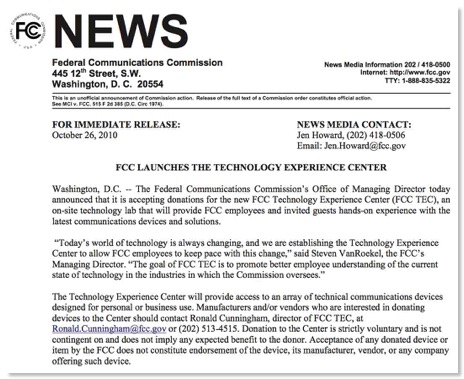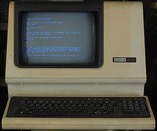FCC's "Technology Experience Center" - A Great Idea or Signs of a Deeper Problem

“It was the best of times, it was the worst of times” -- Tale of Two Cities
Yesterday FCC announced its new “Technology Experience Center” - “an on-site technology lab that will provide FCC employees and invited guests hands-on experience with the latest communications devices and solutions.” The underlying problem here is that FCC is really substantially underfunded and almost all of its budget goes to non-discretionary items like salaries, rent, and utilities. I recall many years ago hearing that FCC’s ratio of non-discretionary spending to total budget was one of the highest of any federal agency.
The FCC’s Lab and the Enforcement Bureau’s technical equipment spending is usually budgeted near zero at the beginning of each fiscal year in order to balance spending with the final appropriation and equipment is usually hurriedly selected and bought at the end of the fiscal year when it is determined how many crumbs are left over from the dominant non-discretionary part of the budget. (Since procurement rules expect competition for equipment procurement and there is usually not enough time for such competition, technical equipment purchases pragmatically must be limited to what is on GSA contract or items that DoD is buying in large quantity and allows other agencies to “ride the contract”. Sometimes this is the right equipment for FCC’s needs, sometimes it isn’t but it is the only equipment that can be bought in the fading light of the fiscal year in August.) But contrast, the WTB auctions operation has access to auction funds and is not limited to appropriated funds. During my years at FCC, every auctions staffer had a larger display on their CRT than every “normal” FCC employee as a sign of their superior budgetary status.


When Blackberries became the hit fad about 10 years ago, they were only available to the “elite” in FCC. As a mere SES techie, of course, I had no access to such technology even though my wife at DOE did. Thus I had to learn from her how these were changing the world. Needless to say mere GS-xx staffers - who were not intimates of the Chairman’s Office - also never had access to Blackberries and had to guess about their impact.
So the new FCC TEC is a pragmatic approach so that FCC staffers can see, touch, and use the technology that is changing our world and impacting communications.
But I hope it doesn’t divert attention about the serious underfunding of FCC with respect to its mission. One explanation I once heard from an FCC budget expert is that a root cause of the problem is that during the Reagan era there was a White House push to hold down spending but most agency heads pushed back against the biggest cutbacks. But then FCC Chairman Fowler and Managing Director Minkel were “true believers” in the Reagan Agenda and did not argue with OMB about cutbacks. Thus later when reason returned to federal budgeting and agencies were allowed to increase spending by a flat percentage, FCC was starting from a lower baseline and is still suffering from that lower baseline.
So for those who look back nostalgically on the Reagan years, many of FCC’s budget problems today date from that era.



![Validate my RSS feed [Valid RSS]](valid-rss-rogers.png)

